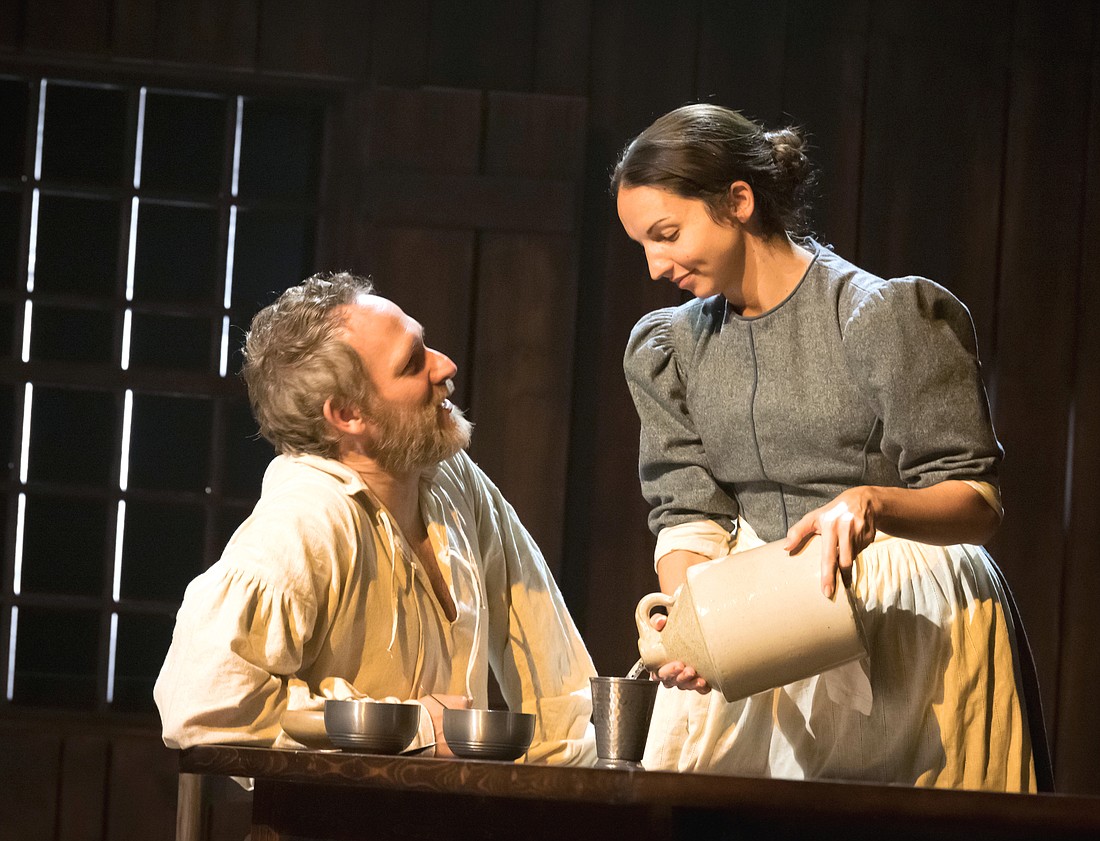- April 24, 2024
-
-
Loading

Loading

Arthur Miller’s “The Crucible” is turning up the heat with Asolo Repertory Theatre. It’s a play about a witch hunt. But that’s like saying “Hamlet” is about Danish politics.
“The Crucible” resonates on many levels …
For directors of stage and screen, this play is a gold mine of possibilities. It’s been done — and done well — as political allegory, psychological study, feminist parable and realistic slice of history.
This version revolves around terror itself. The world of this production has the feel of a brutal, Kafkaesque police state. And there’s no slow build to the terror. The witch’s brew comes quickly to a boil.
The place: Salem Massachusetts. The year: 1692. A group of teenage girls dance naked in the woods. They’re caught in the act — and there’s hell to pay. An investigation starts, turns into a witch hunt, and spirals out of control. Doors open, and bossy officials appear in your home asking harsh questions after midnight. Fingers point, and friends disappear. Paranoia grows, fed on bad logic and bad faith. (There’s a selfish motive for naming witches. Accuse a friend, and grab their land. Accuse your friend’s wife, and you can replace her.) Once the trial begins, there’s only one way out. Confess to being a witch, and accuse your neighbor.
Coburn Goss’ John Proctor is the reluctant Everyman at the heart of it all. A farmer, a father, a decent guy who had one affair. He pays for it — with hellish interest. As his wife, Laura Rook’s Elizabeth is no all-forgiving saint. She’s all too human — and her ultimate loyalty means more because of it. David Breitbarth’s Rev. Parris is a smug, self-serving intellectual who never sticks his neck out for what’s right. Amanda Fallon Smith’s Abigail is a mad thing, but she’s crazy like a fox. The act of love has an implied promise. She aims to collect on John Proctor’s lustful promise — if the heavens fall, so be it. Gabriel Lawrence’s Rev. John Hale honors the letter of the law and timidly fights for its spirit when it’s far too late. Matt DeCaro’s Deputy-Governor Danforth is untroubled by conscience. He fights for himself at all times.
Edwards’ direction unfolds Miller’s vision with a sense of real-time urgency. The playwright’s script is scrupulous about causality. In the safety of your seat, you can connect the dots to lusts and landowners. But the characters living through the witch hunt can’t make sense of it. Edwards aptly captures their confusion in the moment.
Miller’s nightmare unfolds in Lee Savage’s nightmarish set. It’s a claustrophobic barn, a warehouse of emptiness, and many other bad dreams. Jen Schriever’s lighting constantly transforms the scene — now rows of blazing windows, now murky desolation. Tracy Dorman’s costumes are never surreal or expressionistic. The world is insane. But it’s inhabited by ordinary human beings.
The loss of human connection is the heart of Miller’s tragedy. The social contract rips and tears apart friends, and families in the process. Holding onto our fragile human bonds is a matter of choice. Good or bad, the choices start out small. In the end, they determine whether or not society goes to hell.
But it’s always a question of choice. And responsibility.
Miller’s very clear on that point, and it applies both to literal witch hunts in the 1690s and the hunt for secret communists in the 1950s. Or any persecution.
The witch hunt of “The Crucible” isn’t a wildfire; it’s the work of human beings. At every step along the way, the hunter in charge could stop. But he keeps the hunt going — even when he knows it’s based on lies. Admitting he’s been conned by teenage girls would be embarrassing, after all. Saving face is the top priority, not saving souls.
The play ends on a heartbreaking note. But the heartbreak wasn’t inevitable. Both in 1692 and 1953, it was a matter of choice. That holds true for the next heartbreak.
It doesn’t have to happen.